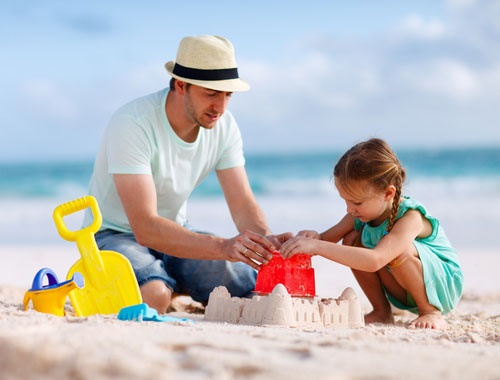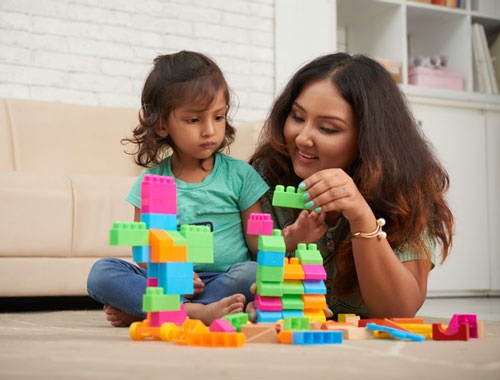
This story by The Conversation is republished as part of our series of articles written by local and international academics and researchers. The views expressed don't necessarily reflect that of Parent24 or Media24.
A three-year-old boy struggles to thread beads on a string while his older sister watches. She could ignore him or take over the task to get it done quickly.
But if she observes him closely, and realises that he is struggling to hold the string steady, she could offer to hold it for him and praise him for any beads he threads.
This approach — which includes awareness of the child’s cues, clear communication, back-and-forth reciprocity and guidance that adapts to where the child is at — would be an example of the sister “bridging minds” with her brother.
Our research team at the University of Toronto has spent the past five years working to measure and teach the specific behaviours that promote children’s language and cognitive skills.
We have defined supportive interactions as those in which two minds are “bridged.” We also call this “displaying cognitive sensitivity.”
Our research shows that children who grow up with siblings who display this type of sensitivity often tend to have stronger language skills and are better able to see things from another’s perspective.
It also shows that when parents and teachers adapt their own behaviours based on what a child is thinking, they help that child to learn and grow.
- Also see: Should babies watch TV?
What's going on in someone else's head
Bridging minds describes what it means to step outside of one’s own thoughts, and to recognise and be responsive to what is going on in someone else’s head.
Specifically, it’s the ability to determine what the other person knows, what interests them in a given moment, what they are capable of doing, what types of instructions or support they need, and then to respond accordingly.
This concept moves beyond early work on the topic of sensitivity, which focused on the need to be responsive to how children are feeling in order to support children’s emotional development.
Instead, it draws on more recent research from the field of neuroscience, which has highlighted that responsive serve-and-return interactions are just as critical for stimulating children’s early brain development. Indeed, building bridges is about building brain connections.
- Also see: How stories change your child's brain
Applying the science
The breakthrough of our research is that we have come up with a reliable and efficient way to measure the extent of “mind-bridging” occurring in such interactions.
This involves trained researchers using simple checklists to evaluate interactions of children with siblings, parents or early-childhood educators — based on live or video-recorded interactions of pairs or groups.
The whole process can be completed in less than 10 minutes.
Our next challenge is supporting people to use the “bridging minds” approach more often in their interactions with children. Many parents and professionals know that “early experiences matter” and “zero-to-three is a vital period for human development,” but still need more practical tools to make the most of these early years.
Our research team is currently conducting intervention studies with home-visiting nurses in Brazil and, in collaboration with colleagues at George Brown College, with early childhood educators in the Toronto area.
The goal of these studies is to help these populations build more bridges with children on a daily basis.
- Also see: Early development is the key!
Maximise "brain nutrition"
While waiting for the results of these studies, our research team has some suggestions for how to ensure children get the most “brain nutrition” out of every interaction.
In moments of play or daily routines, parents, guardians and early learning professionals can consider:
What is this child looking at and thinking about? How can I engage them, following their lead?
Start a conversation by commenting on what they’re doing. Then, try adding on to what they are already thinking about to extend their learning.
For a child playing with blocks: “What are you building there? A tower! Oh that’s a big tower. It’s already one, two, three bricks high with three different colours. Let’s see what you will do next with the tower?”
- Also see: Maths for kids at 30 months!
Let children try things themselves
It’s helpful for parents and early learning professions to wonder:
What is this child capable of doing? How can I help him/her learn and succeed based on their interests?
Offer a hand to help them expand what they can do by themselves. And keep the interactions going back and forth without taking over.
Letting children try things themselves and providing positive feedback can reap real benefits.
For a child who is having trouble scooping water with a bucket: “Oh dear. It’s hard to get the water, isn’t it? I hold the bucket with both hands to make it easier for me. Want to try? Great job, you did it!”
![]() Every interaction is an opportunity to expand what a child knows. To help build brains, parents, educators, siblings, grandparents and other caregivers can all try “bridging minds.”
Every interaction is an opportunity to expand what a child knows. To help build brains, parents, educators, siblings, grandparents and other caregivers can all try “bridging minds.”
Nina Sokolovic, Doctoral Student in Developmental Psychology and Education, University of Toronto; Jennifer Jenkins, Atkinson Chair of Early Child Development and Education and Director of the Atkinson Centre, University of Toronto, and Michal Perlman, Associate Professor of Applied Psychology and Human Development, University of Toronto. This article was originally published on The Conversation. Read the original article.
Read more:
- Mozart magic and the developing brain
- Stunting baby's development
- The cartoons, the videos, the puzzles that will dazzle your child's brain
Sign up for our weekly newsletter to receive Parent24 stories directly to your inbox.




 Publications
Publications
 Partners
Partners












